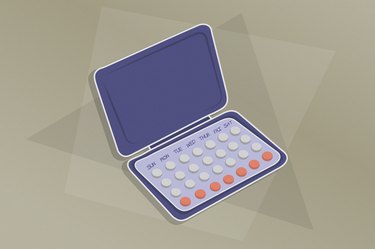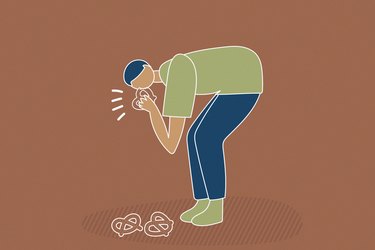
Makeup has been around for thousands of years. It's a form of self expression, and it can boost your confidence. But while it's fun to use, there are also some hard-and-fast rules around it.
For example, you should never share makeup with others, as this could lead to an infection. You should also avoid sleeping in makeup and exercising while wearing it because both could cause breakouts.
Video of the Day
Video of the Day
Still, the question remains: How important are makeup expiration dates, and is it "bad" to use old makeup?
Here, we spoke to dermatologists to understand how long makeup lasts and whether it's bad to use expired makeup.
Does Makeup Expire?
Yes, makeup expires. Expiration dates aren't usually as easy to find as those on food products and over-the-counter medicine, but makeup doesn't last forever.
Some cosmetics have printed expiration dates on them, so you know when your makeup will go bad. Typically that includes the month and year, but not all will have specific dates listed.
Michele Farber, MD, FAAD, a board-certified dermatologist with Schweiger Dermatology Group in Philadelphia, says to look for an icon with a number in it next to the letter M.
"Makeup products have an image of a jar that signals the number of months that a product is good for once it's opened," she says.
For example, 12M indicates you have a year to use up the product once you open it. This is known as the Period After Opening (POA) symbol.
If your product doesn't have this label or if you lost track of how many months have passed, there are some other signs that makeup has spoiled. Simply put your senses to good use.
"If the makeup changes color or has a foul odor, it is likely expired and should not be used," explains Marisa Garshick, MD, FAAD, a board-certified dermatologist in New York City.
You can also look for textural changes, such as separation and changes in consistency.
The rate at which makeup expires varies depending on the product, but products generally last for a few months to a few years. Creamy or liquid makeup tends to expire faster than dry or powdery makeup, according to the Cleveland Clinic.
Risks of Using Expired Makeup
You may be tempted to use expired makeup, but dermatologists warn against this. While makeup is expensive to replace, it's better to throw out cosmetics that are past their prime for a number of reasons.
"If makeup has expired, it often means that the preservatives used to help prevent overgrowth of bacteria may no longer be as effective," Dr. Garshick says. "This may contribute to skin issues like infections, irritation and acne."
1. Irritation
Expired makeup is a breeding ground for bacteria and mold — especially products that come in contact with your skin, such as concealer wands or pots you dip your fingers in.
The rapid growth of bacteria along with the buildup of moisture that invites mold could lead to skin redness and irritation, according to the Mayo Clinic Health System.
Skin inflammation can also accompany irritation caused by using expired cosmetics, Dr. Garshick adds. For this, your dermatologist may recommend gentle skin care and moisturizing, or they may sometimes prescribe a topical steroid to bring down the inflammation, she says.
2. Infection
"The biggest concern when using expired makeup is causing skin infections," Dr. Farber explains. "Water-based cosmetics, such as foundation, can provide a medium for bacteria to grow."
Expired makeup could lead to skin infections like staph infections, impetigo and folliculitis, according to the American Academy of Dermatology (AAD).
The treatment for skin infections caused by expired makeup depends on the type of infection, but topical and oral antibiotics may be needed.
Eye infections are also a concern because many makeup products are used around the eye area, such as mascara and eyeliner. Using expired eye makeup products can increase the risk of eye infections like pink eye. While some cases of pink eye go away on their own, antibiotics or ointments may be needed, per Stanford Health Care.
3. Allergic Reactions
If you're prone to allergic reactions, stay on top of your makeup's expiration. Over time, the chemical composition of makeup can change, notes Brendan Camp, MD, a board-certified dermatologist in New York City. This can lead to allergic reactions like rashes or contact dermatitis, he says.
"Allergic reactions may present with redness, itchiness, swelling or scaly patches," Dr. Camp says.
To soothe symptoms, your dermatologist may prescribe steroids, corticosteroids or antihistamines, according to the National Eczema Association.
4. Acne
Bacteria is a common cause of acne. When bacteria grows in old makeup, it could cause or worsen acne, Dr. Farber says. Acne-causing bacteria can stick to makeup, notes the AAD, making matters worse.
Once you stop using bacteria-laden makeup, your acne may clear up. To help speed up the process, use active ingredients like benzoyl peroxide, salicylic acid or adapalene, as recommended by the AAD.
5. Styes
Using eye makeup products like eyeshadow, mascara and eyeliner can lead to eye problems if those products are expired or old, per the Mayo Clinic.
"When used around the eye, expired makeup may also contribute to styes," Dr. Garshick says. (Styes are red bumps on the eyelid that are often painful and filled with pus.)
To prevent both eye infections like pink eye and styes around the eyes, it's important to replace your eye makeup regularly. For these reasons, eye makeup expires faster than other products.
If you develop a stye, you can typically treat it at home. Apply a warm (not hot!) compress for about 10 minutes several times a day, notes the Mayo Clinic. You can also try gently massaging the area to help loosen the clog.
If symptoms persist after 48 hours, your doctor may recommend something stronger. You should also see a doctor if the stye is causing significant swelling or if you develop a fever or vision changes.
When to See a Dermatologist
Any side effects from using expired makeup products warrants a trip to see your doctor or dermatologist.
"If skin irritation or sensitivity occurs after using a product, it's recommended to seek the advice of a board-certified dermatologist who can help you determine the cause and prescribe the appropriate treatment," say Dr. Camp.
Some treatments are only available with a prescription from a doctor, so you shouldn't wait to be seen. Antibiotics to treat infections and prescription-strength steroids to reduce irritation, for example, aren't available over the counter.
Unknown causes of rashes or acne are also reasons to see your dermatologist, Dr. Garshick says. They can get to the root cause and determine the best treatment. It may be as simple as throwing out your old, expired makeup, but you might also need a health care professional's help resolving your symptoms.
- Mayo Clinic Health System: “Risks of using expired makeup”
- American Academy of Dermatology: “When to toss your makeup and sunscreen”
- Stanford Health Care: “Pink Eye Treatment”
- Cleveland Clinic: “When Should You Toss Your Makeup?”
- National Eczema Association: “Contact Dermatitis”
- American Academy of Dermatology: “I have acne! Is it okay to wear makeup?”
- Mayo Clinic: “Stye(sty)”
Is this an emergency? If you are experiencing serious medical symptoms, please see the National Library of Medicine’s list of signs you need emergency medical attention or call 911.



